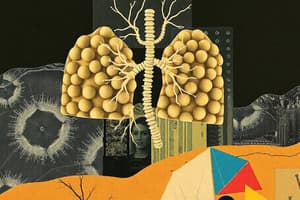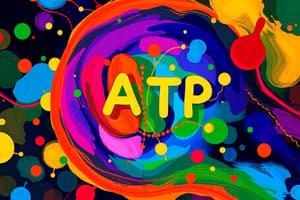Podcast
Questions and Answers
What is the basic unit of life in biology?
What is the basic unit of life in biology?
- Atom
- Molecule
- Cell (correct)
- Organism
Which of the following processes is primarily responsible for energy production in cells?
Which of the following processes is primarily responsible for energy production in cells?
- Photosynthesis
- Cellular respiration (correct)
- Diffusion
- Mitosis
What is the role of DNA in biology?
What is the role of DNA in biology?
- Stores genetic information (correct)
- Provides energy to cells
- Defends against pathogens
- Transports nutrients
Which of the following best describes homeostasis?
Which of the following best describes homeostasis?
Which of the following is a characteristic of living organisms?
Which of the following is a characteristic of living organisms?
Which mechanism of evolution involves survival and reproduction of organisms with advantageous traits?
Which mechanism of evolution involves survival and reproduction of organisms with advantageous traits?
What is the term for the formation of new and distinct species?
What is the term for the formation of new and distinct species?
What do biomes represent in ecological studies?
What do biomes represent in ecological studies?
Which of the following is a primary focus of conservation biology?
Which of the following is a primary focus of conservation biology?
What does molecular evidence, such as DNA sequences, help to establish in evolutionary biology?
What does molecular evidence, such as DNA sequences, help to establish in evolutionary biology?
Which of the following correctly describes a primary difference between prokaryotic and eukaryotic cells?
Which of the following correctly describes a primary difference between prokaryotic and eukaryotic cells?
What is the main purpose of cellular respiration?
What is the main purpose of cellular respiration?
Which of the following describes the function of the Golgi apparatus?
Which of the following describes the function of the Golgi apparatus?
Which statement accurately describes DNA replication?
Which statement accurately describes DNA replication?
What role do mutations play in genetics?
What role do mutations play in genetics?
Which microorganism is classified as a eukaryote?
Which microorganism is classified as a eukaryote?
What is the primary focus of microbial ecology?
What is the primary focus of microbial ecology?
What does Mendelian genetics primarily describe?
What does Mendelian genetics primarily describe?
Flashcards
Biology definition
Biology definition
The study of life and living organisms.
Life's characteristics
Life's characteristics
Features that distinguish living organisms from non-living things, including growth, reproduction, etc
Living organisms
Living organisms
Organisms that exhibit all the characteristics of life.
Key concepts in biology
Key concepts in biology
Signup and view all the flashcards
Importance of studying biology
Importance of studying biology
Signup and view all the flashcards
Evolution
Evolution
Signup and view all the flashcards
Natural Selection
Natural Selection
Signup and view all the flashcards
Adaptation
Adaptation
Signup and view all the flashcards
Ecosystem
Ecosystem
Signup and view all the flashcards
Biodiversity
Biodiversity
Signup and view all the flashcards
Prokaryotic Cells
Prokaryotic Cells
Signup and view all the flashcards
Eukaryotic Cells
Eukaryotic Cells
Signup and view all the flashcards
Cell Membrane
Cell Membrane
Signup and view all the flashcards
Cellular Respiration
Cellular Respiration
Signup and view all the flashcards
Mitosis
Mitosis
Signup and view all the flashcards
DNA
DNA
Signup and view all the flashcards
Gene
Gene
Signup and view all the flashcards
Mutation
Mutation
Signup and view all the flashcards
Study Notes
Cell Biology
- Cells are the basic units of life.
- Prokaryotic cells lack a nucleus and membrane-bound organelles, while eukaryotic cells have both.
- Cell structures like the cell membrane, cytoplasm, nucleus, mitochondria, endoplasmic reticulum, Golgi apparatus, lysosomes, and vacuoles each have specific roles.
- Cell membranes control what enters and leaves the cell (passive and active transport).
- Cellular respiration converts glucose to energy (ATP).
- Cell division (mitosis, meiosis) enables growth, repair, and reproduction.
- Cell signaling is essential for cell communication.
Genetics
- Genetics studies heredity and variation.
- DNA is the genetic material, directing protein synthesis.
- Genes are segments of DNA coding for traits.
- DNA's double helix structure has base pairs (A-T, C-G) bonded by hydrogen bonds.
- DNA replication ensures accurate genetic copies during cell division.
- Gene expression involves transcription (DNA to RNA) and translation (RNA to protein).
- Mutations are DNA sequence changes, affecting traits.
- Mendelian genetics describes single-gene inheritance patterns.
- Chromosomes are DNA-containing structures with genes.
- Genetic technologies (PCR, electrophoresis, CRISPR) are vital tools.
Microbiology
- Microbiology studies microorganisms (bacteria, viruses, fungi, protozoa).
- Bacteria are single-celled prokaryotes, important in nutrient cycles and decomposition.
- Viruses aren't cells; they have genetic material (DNA or RNA) inside a protein coat and need a host to replicate.
- Fungi are eukaryotic, unicellular (yeasts) or multicellular (molds, mushrooms).
- Protozoa are single-celled eukaryotic microorganisms.
- Microbial ecology studies the interactions between microorganisms and their environment.
- Microbial diversity is vast and vital for ecosystems.
- Pathogens (bacteria, viruses, fungi) cause diseases.
Evolution
- Evolution is the change in heritable characteristics over generations.
- Natural selection leads to organisms with advantageous traits surviving and reproducing more.
- Genetic drift is random allele frequency change in a population.
- Speciation forms new species.
- Evolutionary history shows shared ancestry and divergence.
- Fossils provide evidence of past life and transitions.
- Molecular evidence (DNA sequences) supports evolutionary relationships.
- Adaptation improves an organism's survival and reproduction.
Ecology
- Ecology studies interactions between organisms and their environment.
- Ecosystems include biotic (living) and abiotic (non-living) components.
- Energy flows through ecosystems with food chains and webs.
- Nutrient cycles (carbon, nitrogen, phosphorus) are essential.
- Population dynamics studies interactions within a species.
- Community ecology studies species interactions in an area.
- Biomes are large-scale ecosystems.
- Biodiversity is the variety of life.
- Human impact is a major ecological focus.
- Conservation biology protects and restores species and habitats.
Studying That Suits You
Use AI to generate personalized quizzes and flashcards to suit your learning preferences.



